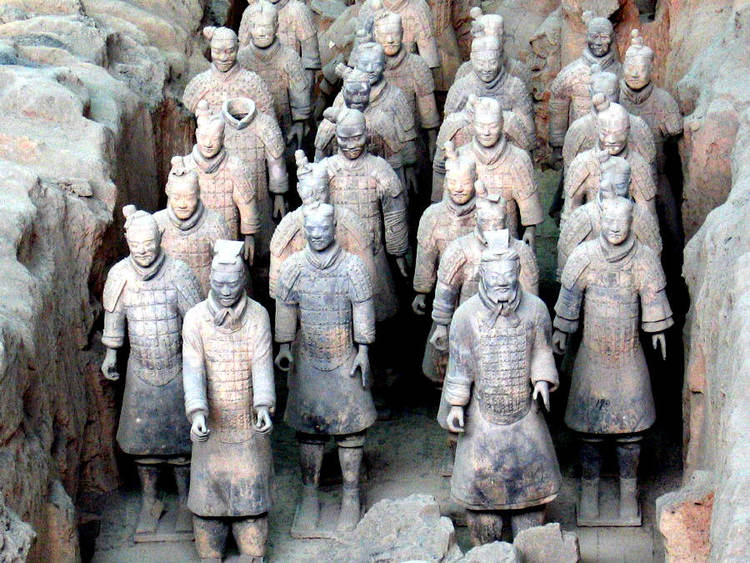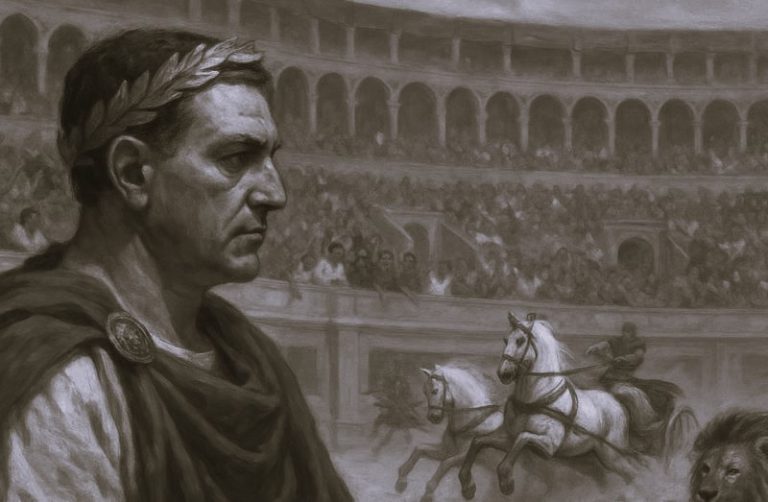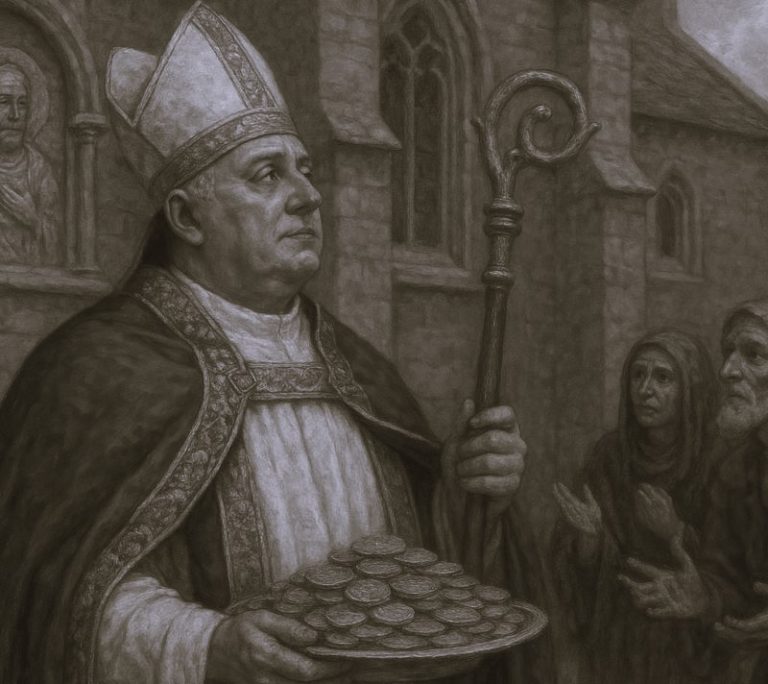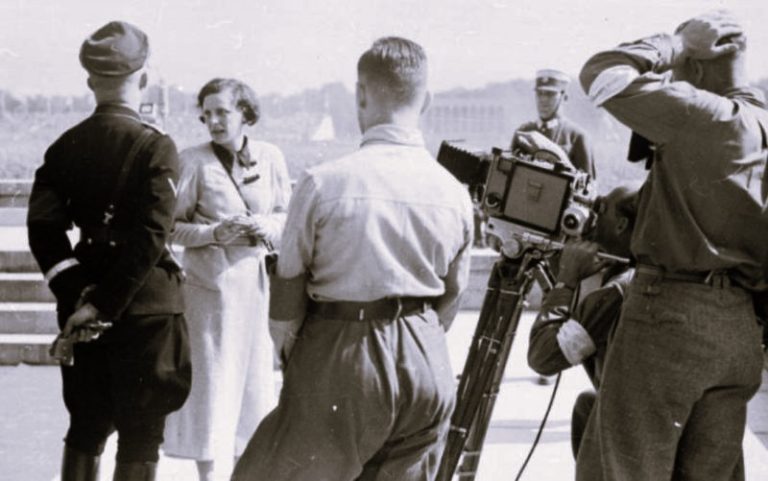

The Qin Dynasty he founded gave its name to China.

By Dr. Joshua J. Mark
Professor of Philosophy
Marist College
Introduction
Shi Huangdi (l.259-210 BCE/r.221-210 BCE, also known as Qin Shi Huang, Qin Shih Huandi, Shi Huangti or Shih Huan-ti) was the first emperor of a unified China. Shi Huangdi means `First Emperor’ and is a title, not a proper name. The Qin Dynasty he founded (pronounced `Chin’) gave its name to China and it was he who first initiated the building of the Great Wall and construction of the Grand Canal.
He was born Ying Zheng (also known as Zhao Zheng) of the State of Qin to a dancing girl named Zhao Ji and King Zhuangxiang of Qin. According to the historian Szuma Chien (Sima Qian, 145/35-86 BCE) he was not actually Zhuangxiang’ s son as his mother was already pregnant by Lu Buwei, the wealthy merchant who brought Zhao Ji to the king. As Szuma Chien was hostile to Shi Huangdi (as almost all later writers are) this claim has been often disputed.
Rise to Power
The young prince grew up at the Qin court and assumed the throne at age 12 or 13 following his father’s death. Lu Buwei had risen in the court to become a minister and was made regent until Ying Zheng came of age. Again according to Szuma Chien, Lu Buwei became concerned that his son would recognize him as father and so lose the throne and he therefore distanced himself from Zhao Ji and encouraged another of the court, Lao Ai, to keep her company in his place. Lao Ai disguised himself as a palace eunuch and so came and went from the queen’s chamber without suspicion. They had two sons together who were kept a secret from everyone at court except Lu Buwei. It occurred to Lu that one of these secret sons could better serve as King of Qin as he would then no longer have to worry about being exposed as the boy’s father and so organized a coup.
In 238 BCE, when the young king was away from court on travels, Lao Ai used the signet ring of Zhao Ji to mobilize a segment of the army in revolt. The king sent his army against Lao Ai’s forces, defeated them, and had Lao executed by being torn apart. He then had Lao’s entire family executed and placed Zhao Ji in seclusion under virtual house arrest. Lu Buwei committed suicide by poison. King Ying Zheng then named his close associate Li Siu as Prime Minister and ruled fully over the state of Qin.
Victory over the Warring States
The Warring States Period in China (476-221 BCE) was a time when the central government of the Zhou Dynasty, located at Luoyang, was no longer able to administrate effectively. The country had broken into seven separate states, Chu, Han, Qi, Qin, Wei, Yan, and Zhao who continuously fought each other for supremacy. None of these states felt confident enough to wrest the Mandate of Heaven (the principle by which a ruler was legitimized) from the Zhou Dynasty as none were able to gain advantage over any other.
Every state fought using the same tactics and strategies as the others and their aims were further hampered by the efforts of the pacifist philosopher Mo Ti, an able engineer, who seems to have provided each state with the same types of technology in order to neutralize any advantage. Although the state of Qin had a formidable army, iron weapons, and war chariots, King Zheng was unable to make any significant headway in victory over the other states.

One of the most influential statesmen in Qin was the politician Shang Yang (died 338 BCE) who developed and codified the philosophy of Legalism and advocated total war. Prior to Shang’s reforms, warfare was considered a nobleman’s game of skill and strategy in which one observed definite rules which could not be broken. It was common practice to allow an enemy force to mobilize on the field and even to pass into position without molestation. A commanding general did not attack non-combatants and was expected to treat a defeated foe with honour.
At the Battle of Changping (260 BCE), the Qin employed Shang’s ideology to defeat the state of Zhao but, afterwards, made little further progress. King Zheng, making full use of Shang Yang’s philosophies, and leading an army of considerable size, swiftly defeated the six other states. Han fell in 230 BCE, Zhao in 228, Wei in 225, Chu, in 223, Yan in 222, and Qi in 221BCE. Zheng then united the states under his single rule, claimed the Mandate of Heaven from the Zhou Dynasty, and proclaimed himself First Emperor of China – `Shi Huangdi’, founder of the Qin Dynasty.
The Qin Empire
Having consolidated his empire, he turned his attention to administration and, with the help of Li Siu, “resolved to base Chinese society not, as heretofore, upon custom and local autonomy, but upon explicit law and a powerful central government” (Durant, 695). Initially, this government served the people in that Shi Huangdi’s policies allowed for substantial building projects and prosperity. He,
…simplified official ceremonies, issued a state coinage, divided most of the feudal estates, prepared for the prosperity of China by establishing peasant proprietorship of the soil, and paved the way for unity by building great highways in every direction from his capital…Traveling in disguise and unarmed, he made note of abuses and disorders, and then issued unmistakable orders for their correction. He encouraged science and discouraged letters. (Durant, 696)
In all ways, the early Qin Dynasty worked to improve the lives of the people. The walls and fortifications which once enclosed the borders of the separate warring states were destroyed and the Great Wall was begun from their ruins, marking the northern boundary of the empire and protecting the land from marauding nomad tribes. In the south, the Lingqu Canal was built to aid in transport and in trade. Weapons of the defeated states were melted down and made into works of art.

This time of peace and prosperity, however, was short-lived. In 213 BCE Li Siu, having grown tired of hearing Confucian scholars criticize the regime by comparing it to the past dynasties of a `golden age’, wrote, “I suggest that the official histories, with the exception of the Memoirs of Qin, be all burnt, and that those who attempt to hide [other works] be forced to bring them to the authorities to be burnt” (Durant, 697). Although life during The Warring States Period had been difficult, it had given rise to The Hundred Schools of Thought which comprised writings such as those of Confucius, Mo Ti, Mencius, Teng Shih, and Yang Zhu, among many, many others.
Maintaining Shang Yang’s strict philosophy of Legalism as the official policy of the government (which he had instituted at the start of his reign) Shi Huangti re-wrote the legal codes, suppressed freedom of speech, burned the books, and put to death all that refused to comply. This period of his reign is known as the `Burning of the Books and the Burying of Philosophers’. Durant writes, “The only permanent result was to lend an aroma of sanctity to the proscribed literature and to make Shi Huangti unpopular with the Chinese historians. For generations the people expressed their judgment of him by befouling his grave” (697) and his own son, Fusu, criticized him in pointing out that Shi Huangti had copies in his private library of the same books he denied to the people.
Shi Huangti’s Death and the Fall of the Qin
Shi Huangdi had been subject to assassination attempts in the past but now they increased. “He sat on his throne with a sword across his knees and let no man know in what room of his many palaces he would sleep” (Durant, 697). He became obsessed with death and sought elixirs of immortality. Failing in that, he set about to provide himself with as comfortable and secure an afterlife as the present one he was living. He decreed a palace be built as his tomb and commissioned artisans to create an army of over 8,000 terracotta warriors, fully armed, to protect him on the other side. The tomb was so extravagant that it was said to be a vision of heaven and, once built, it was buried and booby-trapped to prevent looting.
In 210 BCE, Shi Huangdi died on a trip to find the elixir of life which would grant him immortality. Some sources indicate that he died by poisoning after drinking what he thought was the elixir. Li Siu kept his death a secret until he could change the emperor’s will to name his young, pliable son as heir, whom Li Siu thought he could manipulate. He had Shi Huangdi’s body brought back to the capital concealed in a merchant caravan of dead fish in order to hide the smell of the decomposing corpse, changed the will, and then announced the passing of the First Emperor and the accession of his son, Hu-Hai, who took the name Qin Er Shi.
The new king reigned poorly for three years and was famous for killing messengers who brought him bad news (marking his only legacy, the origin of the saying, `Don’t kill the messenger’). During this time Li Siu was executed and his co-conspirator in raising Qin Er Shi to power, Zhao Gao, forced the young emperor to commit suicide. Following this coup, Qin Er Shi’s nephew took the throne and had Zhao Gao executed. At this point, with the government in complete disarray and no competent heir to the throne, the country rose in rebellion. The Qin Dynasty collapsed and, after a period of civil war between the states of Chu and Han (known as the Chu-Han Contention, 206-202 BCE), the Han Dynasty rose to rule China from 202 BCE to 220 CE.
Bibliography
- Emperor Qin’s Terra Cotta Army – National Geographic
- Durant, W. Our Oriental Heritage. (Simon & Schuster, 1954).
- Scarre, C. & Fagan, B.F. Ancient Civilizations [Paperback]. (Pearson/Prentice Hall, 2011).
- Ebrey, P. B. The Cambridge Illustrated History of China. (Cambridge University Press, 2010).
- Liu Yang. China’s Terracotta Warriors. (Minneapolis Institute of Arts, 2012).
- Qian Sima. Records of the Grand Historian. (Columbia University Press, 1995).
- Tanner, H. M. China: A History. (Hackett Publishing Company, Inc., 2010).
- Wintle, J. The Timeline of History: China. (Barnes & Noble Books, 2009).
Originally published by the Ancient History Encyclopedia, 12.18.2012, under a Creative Commons: Attribution-NonCommercial-ShareAlike 3.0 Unported license.






